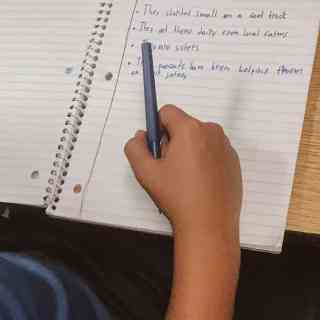This post contains affiliate links. As an Amazon Associate, I earn from qualifying purchases at no cost to you.
Last updated on May 19th, 2023 at 01:12 am
When I know I’m being watched– especially while teaching– my go-to mode is set to clam up and self-destruct.
I’m the classic overthinker, definitely sweating the small and all other kinds of stuff, completely bankrupt in the chill department.
Of all my professional skills, showmanship completely evaded me— which is unfortunate in the teaching world. That’s not to say I wasn’t an engaging teacher– I think I found ways, in the privacy and comfort of my own classroom, to artfully balance the rhythms of effective instruction, the alternating of excitement and quiet study and different modes and energy levels and activities.
But for me, all skill goes out the window when being watched and judged. All of my previous observations had been impacted, at least a little, by my nervousness. My student teaching observations had tanked over the concept. I just wasn’t used to so many eyes fixed on me, at such seemingly high stakes.
So I was gleefully surprised my last teaching observation turned out as well as it did.
This time was different– because I knew I was quitting.
I knew that once school let out, I wouldn’t sign a new contract. I knew that this was quite possibly my last teaching observation ever. I had no particular plans to return to education (though I wasn’t completely sealing the door shut, either). So if it was a flop, that’s all it would be. A flop. Not something affecting my entire professional future.
Here’s what I did:
I created a unit around the fourth-grade economics standards. I fused this social studies unit into the language arts block, and we read literature on finance, economics and business. As a class, we read the novel “Toothpaste Millionaire” by Jean Merrill. I was lucky to have enough for a class set of copies, and we spent time in the novel each day discussing and journaling some of the ELA and social studies concepts.


We also started a small business by turning used glass jars into vases and selling them for Mother’s Day and Teacher Appreciation Week.
A new ice cream and coffee shop had just opened down the street from our school, so I asked the local owners, two sisters, if they’d be up for a Zoom interview with the class. I told them how we had embarked on the small business journey and were eager to hear their story as small business owners.
The sisters agreed to the interview, and I scheduled it right during my observation.
My observation was to take place during my ELA block. I opened with reading and discussing a few pages of “Toothpaste Millionaire.” The students took notes on sticky notes, asked questions, and helped in a discussion of morphology.
Then it was time to start the interview. I had prepped the students on how to conduct an interview, and I chose 3-4 students who seemed to have a good grasp on what an effective interview entailed to ask the questions.
We switched on the Zoom meeting and saw the business owners through the screen, sitting in their shop. (Because we were doing a hybrid model with some students in-person and some online, I also had about ten students in the Zoom meeting as well, watching and learning.)
After a few introductory remarks, I allowed my student interviewers to ask 1-3 questions. The rest of the class was observing and taking notes. I really tried to focus the discussion on their story and how they could impart lessons they learned in business to my young entrepreneurs.
My student interviewers were focused and professional– these fourth graders were practically journalistic professionals! And the shop owners were so gracious and knowledgeable in the interview.

I could tell this was a pretty unique and unprecedented lesson for the principal to observe. I played the big card by having this special experience showcased in the observation. It was different, and maybe a bit risky, but I felt more fears than ever before evaporate.
I could feel myself, yes, sweating a teensy bit, but also having fun.
This never happened in my personal history of teacher observations.
Naturally, I had to commemorate it two years later in a blog post.
My advice for teachers who struggle with observation nerves?
Charmaine
1.The stakes are really not as high as you would think. Now that I’m out of the field, I know an observation is not the life-altering event I once viewed it as.
2. Remember this: style + support. An observation gives your principal a chance to witness your teaching style in full effect– all of those intricate details of what makes you the teacher you are. Your school leader may not get to see your quirks and interactions and the classroom atmosphere you generate in any other setting. For this to be observed, you’ll need to be in a natural state. (I know, easier said than done!) Allow the observer see you in your element. Then if there’s anything he or she has to critique you on, consider it an area that they can come alongside you and support you in.
3. If it doesn’t go that well, there are other jobs out there, and most of them pay more than teaching.
That last advice nugget was tongue-in-cheek, but seriously: try not to freak out. This is coming from a recovering ultimate freaker-outer. I definitely understand. Let me know your observation thoughts, struggles or victories in the comments below!






